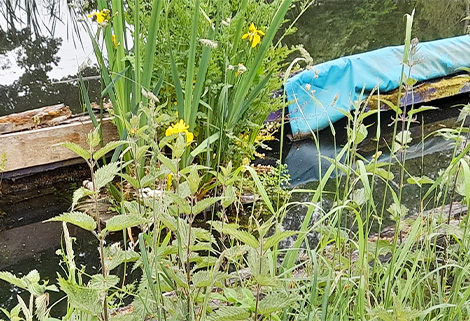dawncraft chronicles
funeral for a friend
When I was young I wanted a Thames barge. We lived near Maldon and some of my early memories were walking along the sea front with loads of old boats in various states of either rebuild or decay. West Mersea at that time was a true grave yard with many old hulls pulled up to the highest of spring tide marks and converted into house boats, getting wet probably only two or three times a year. It always seemed to me to be such as sad end to a boat. As for my Thames barge, well, I could probably afford one, but I certainly couldn’t ever afford to maintain or renovate one.
This got me thinking the other day about Dawn Treader and what would become of her if ever I was incapacitated. Sutton Hoo aside – the idea of being buried in it with all my worldly goods and my desire to go to Valhalla where probably for the first time in years I could stay up late and have a drink with a few friends - wouldn’t go down well from an ecology point of view as although the resin burns well the glass fibre remains. Sadly, the only option would be to break her up and put it all in a 6 cubic yard skip for land fill (may as well be buried in it then).

I did some research on this and came up blank – there are one or two companies that specialise in the destruction and salvage of old sail boats, but no one seems to be dealing with end of life boats on canals and waterways. This is going to be a major problem in say five or ten years. Ok Dawntreader is glass fibre, 1 pot of resin, some matt and gel coat and you can just about fix anything at a reasonable cost – even her brand new transom wasn’t overly expensive in comparison to say a wooden or steel boat. But as I make my way down the canal, you cannot help noticing that many of the barges are coming to the end of their life with what would be astronomical repair costs.
From an engineering point of view, steel and water are a nightmare for corrosion and require really good coatings (paint to you and I ) to prevent the rust. However, there are other problems. The moment we mix in electricity and especially direct current which most of us use from batteries, we set up a form of electrolysis that starts to eat the hull. Ok we all know that we should use sacrificial anodes but what we don’t realise is after a while these become inaffective. I have seen boats with almost a spider’s web look to the hull as the electrolysis eats away at the metal.
I noticed this on Dawntreader's outboard. What appeared to be a half-worn anode simply wasn’t working as it furred up, for want of a better term. Suddenly the edge of her prop or cavitation plate is acting as the anode and the outboard is being eaten alive!!
Add increased licence fees, price rises in both gas and fuel, the lack of places that a boat can be pulled out at a reasonable cost before you even start blacking, hull survey or paying a welder to fit new anodes. I once welded the floors into a Morris 1000, the welding took half a day, removing the interior and years of bitumen under-seal took two weekends and I am sure it's the same for a narrow boat.
This problem seems to be affecting many harbours and inlets around the Cornish coast where boats have been abandoned, leaving it to the harbour authority or local council to dispose of. It would seem dis-owning a boat is just as easy as buying one! From what I have read you inform CRT that you sold it to a bloke down the pub and cancel your licence and seeing as for many this is their home address it would be difficult for any agency to find the real owner should someone walk away.

So, what is the answer? I am lucky being at Foxhangers. I have a decent slip right next door and there is one in the marina at Devizes and a dry dock at Semington. However, head towards Bristol and there is nothing much at all. Considering the number of boats on the canal, that is rather worrying. What we need is yards like I grew up with on the East Coast where boats were pulled out at a nominal fee and there were enough skilled people around to either do the work for you or instruct you for a morning on how to caulk a hull, apply antifouling, change a prop, anode etc., all of which their marina shop had in stock!!! Of course, the tide went out twice a day so as long as you could park off the mud you had 8 hours of dry work time.
Maybe that is where it has gone wrong; may be CRT need to own and rent more dry docks and alleviate a potential problem. However, anyone can own a boat but not all have the practical skills or money to keep them maintained.
I would still love a Thames barge though, but I think we would slowly decay together.

